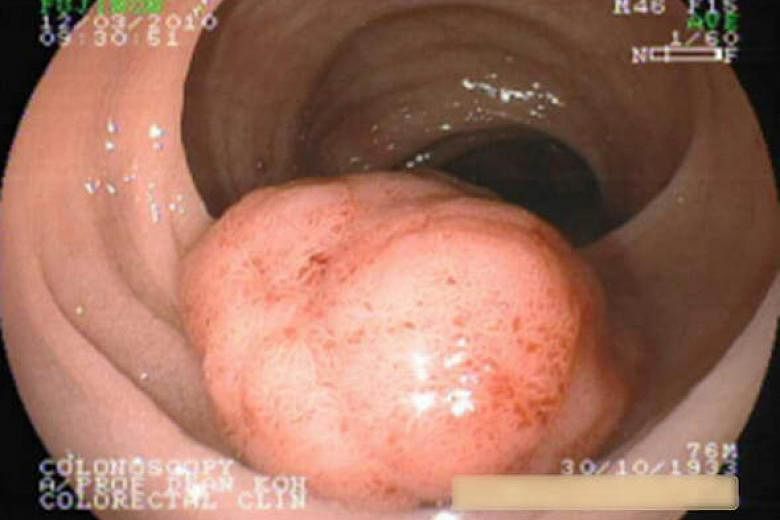Colorectal cancer is the most common cancer in Singapore and in most of the developed countries.
Thankfully, there are good treatments available for it.
Dr Dennis Koh, a consultant surgeon at Mount Elizabeth Hospital, said: "If one is diagnosed with colorectal cancer, it is by no means a death sentence as it is very treatable, especially if it is detected early."
Even better, it is a cancer that can be prevented with screening.
Colorectal cancer, also known as bowel cancer, is a cancer that starts in the colon or the rectum.
The warning signs include:
•A change in bowel habits, like frequent diarrhoea or constipation.
•Tenesmus, or the feeling that you need to have a bowel movement, even after you have just had one.
•Blood in the stool.
•Weakness and fatigue.
•Unintended or unexplained weight loss.
•Abdominal pain or cramps.
•Abdominal bloatedness.
•Changes in stool calibre. You may notice your stools becoming very narrow or thin as a pencil.
•Vomiting. This is caused by the cancer blocking the intestinal tract.
The problem is that many of these warning signs of colorectal cancer may mimic normal benign conditions like constipation and food poisoning.
Dr Koh lists the following four useful pointers:
1 MONITOR YOUR SYMPTOMS
Most, if not all, of us would have experienced all of these symptoms at some point of our lives.
For example, one may experience a sudden bout of diarrhoea and abdominal pain when one gets food poisoning.
However, these symptoms do not persist. They go away when the episode of food poisoning settles.
On the other hand, symptoms due to cancer usually persist and grow more severe with time.
2 TAKE NOTE OF WEIGHT LOSS
The more worrisome signs are a persistent change in bowel habit and unexplained weight loss.
Dr Koh said: "At which point unexplained weight loss becomes a medical concern is not exact."
However, most doctors agree that a medical evaluation is called for if you lose more than 5 per cent of your weight in six to 12 months, without intending to do so, he added.
A 5 per cent weight loss in someone who weighs 70kg is 3.5kg.
3 CONSULT A DOCTOR EARLY
It can be difficult to differentiate between the symptoms caused by benign conditions and by colorectal cancer.
What you can do is to consult your family doctor if you have new abdominal symptoms, especially if these symptoms persist or get more severe.
If the symptoms persist despite treatment, get a referral to see a specialist (colorectal surgeon).
Initially, the symptoms may be mild and patients may dismiss them. As the cancer grows and becomes more advanced, the symptoms will increase in severity.
By this stage, the patients will usually suffer quite a lot of discomfort from the symptoms and will finally seek medical help.
4 GO FOR SCREENING
More importantly, get yourself screened for colorectal cancer when it is appropriate to do so. Do not think that colorectal cancer will not happen to you.
Screening is for people with no symptoms of colorectal cancer. It can detect and remove pre-malignant lesions in the colon to prevent them from developing into cancer.
Screening is highly recommended for those aged 50 and above, but those who are at high risk - such as those with a family history of the cancer - should get screened before that.
Screening tests include a faecal immunochemical test (FIT), which is done yearly to test for small amounts of blood in stools, and colonoscopy, a procedure that can be done every 10 years to look at the inner lining of the large intestine.


